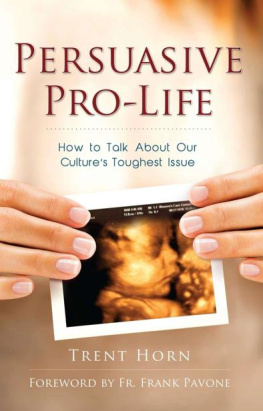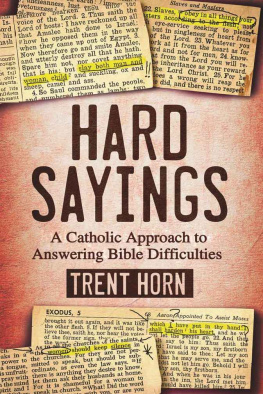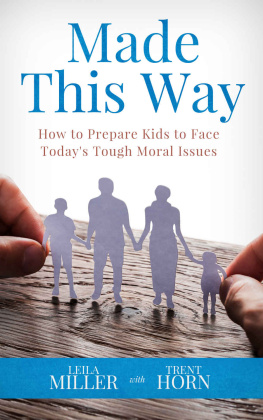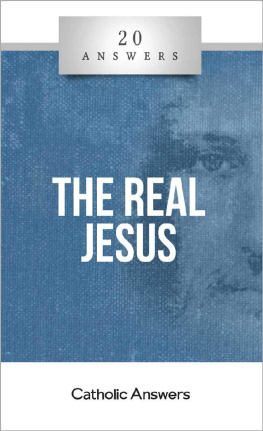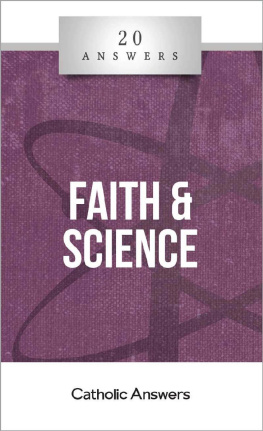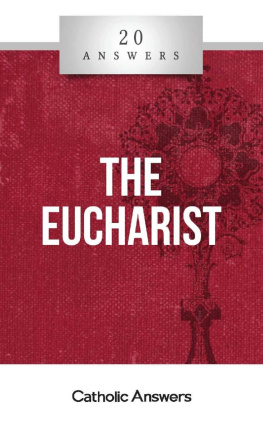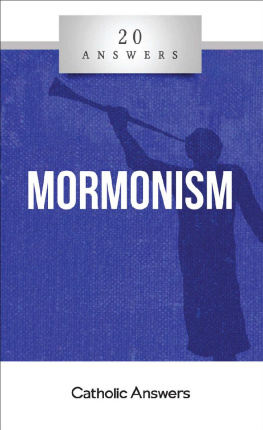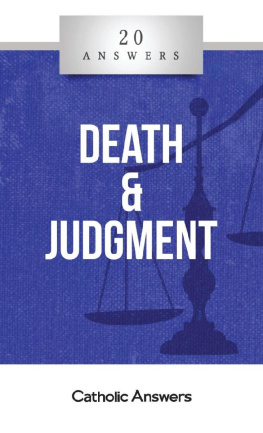Trent Horn - Can a Catholic Be a Socialist?
Here you can read online Trent Horn - Can a Catholic Be a Socialist? full text of the book (entire story) in english for free. Download pdf and epub, get meaning, cover and reviews about this ebook. year: 2020, publisher: Catholic Answers Press, genre: Politics. Description of the work, (preface) as well as reviews are available. Best literature library LitArk.com created for fans of good reading and offers a wide selection of genres:
Romance novel
Science fiction
Adventure
Detective
Science
History
Home and family
Prose
Art
Politics
Computer
Non-fiction
Religion
Business
Children
Humor
Choose a favorite category and find really read worthwhile books. Enjoy immersion in the world of imagination, feel the emotions of the characters or learn something new for yourself, make an fascinating discovery.

- Book:Can a Catholic Be a Socialist?
- Author:
- Publisher:Catholic Answers Press
- Genre:
- Year:2020
- Rating:5 / 5
- Favourites:Add to favourites
- Your mark:
- 100
- 1
- 2
- 3
- 4
- 5
Can a Catholic Be a Socialist?: summary, description and annotation
We offer to read an annotation, description, summary or preface (depends on what the author of the book "Can a Catholic Be a Socialist?" wrote himself). If you haven't found the necessary information about the book — write in the comments, we will try to find it.
Can a Catholic Be a Socialist? — read online for free the complete book (whole text) full work
Below is the text of the book, divided by pages. System saving the place of the last page read, allows you to conveniently read the book "Can a Catholic Be a Socialist?" online for free, without having to search again every time where you left off. Put a bookmark, and you can go to the page where you finished reading at any time.
Font size:
Interval:
Bookmark:
2019 Trent Horn and Catherine R. Pakaluk
All rights reserved. Except for quotations, no part of this book may be reproduced or transmitted in any form or by any means, electronic or mechanical, including photocopying, recording, uploading to the internet, or by any information storage and retrieval system without written permission from the publisher.
All emphasis in Scripture citations added.
Published by Catholic Answers, Inc.
2020 Gillespie Way
El Cajon, California 92020
1-888-291-8000 orders
619-387-0042 fax
catholic.com
Printed in the United States of America
Cover and interior design by Russell Graphic Design
978-1-68357-162-9
978-1-68357-163-6 Kindle
978-1-68357-164-3 ePub
Introduction
In the middle of the third century, the Roman emperor Valerian launched a fierce persecution against the Church that resulted in the martyrdom of Pope Saint Sixtus II along with seven deacons. St. Ambrose tells us that when the Roman authorities demanded that one of the deacons, named Lawrence, hand over the treasures of the Church, he agreed. According to Ambrose, On the following day he brought the poor together. When asked where the treasures were which he had promised, he pointed to the poor, saying, These are the treasures of the Church.
Christ commanded his followers to care for the poor and warned them that ignoring the poor was the same as ignoring him (Matt 25:40). As the Church grew within the Roman Empire, Christians became famous for their generosity, which included not just almsgiving but the construction of the first hospitals that served the poor. The Roman emperor Julian the Apostate lamented how Christians support not only their own poor but ours as well; all men see that our people lack aid from us. For the most marginalized people in Roman society, like widows and abandoned newborns, it was only the generosity of Christians that stood between them and a premature death.
Christian generosity continued to be the difference between life and death for many people even after Christians became the rulers of medieval kingdoms, in which there simply wasnt enough wealth for the state to lift the masses out of poverty. But this began to change with the rise of modern capitalism, as is evident in Adam Smiths famous 1776 essay, An Inquiry into the Nature and Causes of the Wealth of Nations. Christians now had the ability to create wealth, and with that power came moral questions about how to address the perennial problem of poverty.
In the century after Smiths essay was published, revolutionaries in America and Europe tore down the authority of the monarchy and replaced it with democratic republics. Ultimate authority, the revolutionaries said, should lie with the people instead of the king. Other revolutionaries took this democratic ideal even further and said wealth and property should not lie with a few people (be they monarchs or capitalists) but should be owned by all. In 1871, some of these revolutionaries even took over the city of Paris for two months, establishing a socialist commune until the French army retook the city, killing thousands of communards in the process.
By the end of the nineteenth century, the revolutionary spirit showed no sign of slowing and even many Christians were becoming sympathetic to the socialist cause. Christians now had access to more wealth and political power than they had ever possessed in the history of the world, but it wasnt clear how those things should be used to help the poor. All of this was on the mind of Pope Leo XIII as he wrote the introduction to the most famous papal encyclical to address the issue of socialism: Rerum Novarum (Latin: New Things). He says this spirit of revolutionary change is not surprising and notes:
The elements of the conflict now raging are unmistakable, in the vast expansion of industrial pursuits and the marvelous discoveries of science; in the changed relations between masters and workmen; in the enormous fortunes of some few individuals, and the utter poverty of the masses; the increased self-reliance and closer mutual combination of the working classes; as also, finally, in the prevailing moral degeneracy.
The pope goes on to describe how everyone is talking about these new things and so the Church, which teaches us on matters of faith and morals, thought it expedient now to speak on the condition of the working classes.
The socialist revolutions of the nineteenth century spurred the creation of the Churchs social doctrine : the application of its teaching to issues that arise as society changes over time. When it comes to the application of timeless truths to changing circumstances the pope admitted:
The discussion is not easy, nor is it void of danger. It is no easy matter to define the relative rights and mutual duties of the rich and of the poor, of capital and of labor. And the danger lies in this, that crafty agitators are intent on making use of these differences of opinion to pervert mens judgments and to stir up the people to revolt.
Although much has changed in the century since Pope Leo XIII penned these words, many things are still the same. There may not today be calls for violent revolution in America or Europe, but there are grassroots movements seeking to establish socialism through democratic activism. Some of those movements even claim that a Christian is obligated to support socialist economies or else he does not truly follow Christs command to love your neighbor as yourself.
In this book we will apply the Churchs social doctrine to the debate on socialism and show that not only are Catholics not obligated to be socialists, theywe cannot be socialists. It is not a permissible or prudent way to address the problem of poverty.
In part one, we will examine the modern resurgence of socialism and explain why so many people, including faithful Catholics, are attracted to this ideology. Then we will pull back the curtain and show why socialism is an inherently contradictory and unsustainable approach to economics.
In part two we will refute the claim that Christianity gave birth to socialism and show how it was actually conceived in nineteenth-century Europe. Well also explore Pope Leo XIIIs arguments against socialism, especially his claim that it violates the natural right to private property and poses a grave danger to the family.
In part three we continue our historical survey and reveal, in all its horrors, the destruction socialism wrought in the twentieth century.
In part four we turn our attention to capitalism and, while not providing an exhaustive summary and defense, refute arguments that try to justify socialism by saying capitalism is worse or unacceptable as an economic system.
Finally, in part five, we return to the present to examine modern, Catholic defenses of socialism and present a trajectory toward a moral capitalism. For the best approach to economics will not only produce the most wealth and alleviate the most poverty, but will create conditions for the human spirit to flourish, grow in virtue, and be perfected by Gods grace.
Part One
Socialism
Deconstructed
The Return of Socialism
In 2019, 43 percent of Americans consider socialism to be a good thing and millennials are some of its strongest supporters.
But this flirtation with socialism is nothing new; in order to understand it, in fact, we need to go back to the Great Depression. When you see how socialism thrived in that decade, youll understand why its making such a comeback today.
Share the Wealth
By the mid-1930s, following the stock market crash in 1929, the average familys income had fallen 40 percent. But maybe they were the lucky ones compared to the 25 percent of Americans who were unemployed. For many people, volatile markets and greedy bankers were the villains responsible for taking peoples jobs and even their homes. In John
Font size:
Interval:
Bookmark:
Similar books «Can a Catholic Be a Socialist?»
Look at similar books to Can a Catholic Be a Socialist?. We have selected literature similar in name and meaning in the hope of providing readers with more options to find new, interesting, not yet read works.
Discussion, reviews of the book Can a Catholic Be a Socialist? and just readers' own opinions. Leave your comments, write what you think about the work, its meaning or the main characters. Specify what exactly you liked and what you didn't like, and why you think so.

